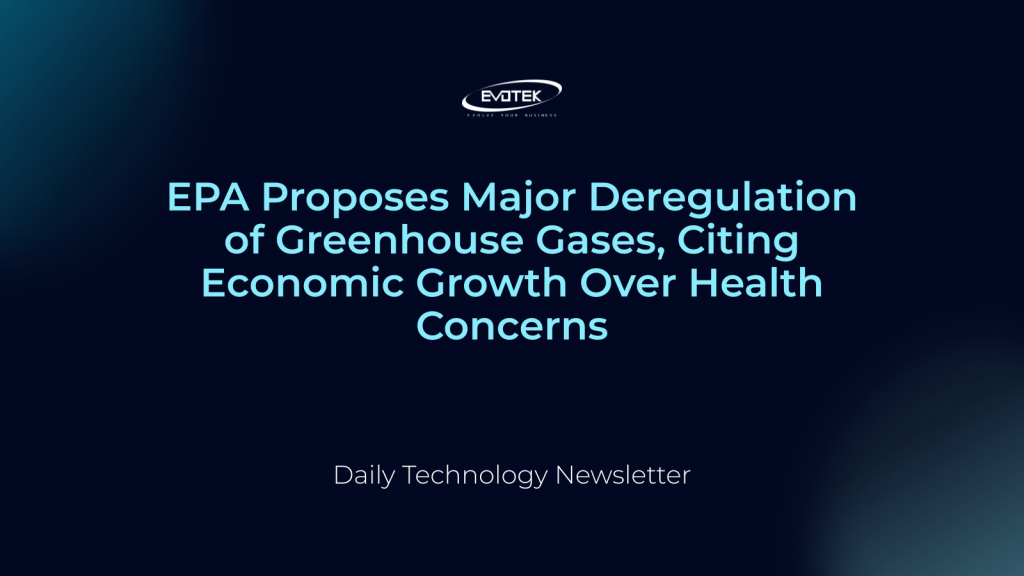The Trump administration has put forth a controversial proposal to significantly curb the government’s authority to regulate greenhouse gases. This move involves dismantling existing rules that govern emissions from vital sectors, including fossil fuel drilling operations, power generation facilities, and automotive vehicles.
Environmental Protection Agency (EPA) Administrator Lee Zeldin formally announced on Tuesday the proposed rescission of a pivotal 2009 declaration. This declaration had previously established that carbon dioxide and other greenhouse gases pose a demonstrable threat to both public health and overall welfare.
Administrator Zeldin stated, “With this proposal, the Trump EPA is proposing to end 16 years of uncertainty for automakers and American consumers.” Earlier that day, during an appearance on the conservative “Ruthless” podcast, Zeldin characterized the intended rescission as the “largest deregulatory action in the history of America,” further adding that it would “driv[e] a dagger into the heart of the climate change religion.”
This initiative represents the latest in a series of efforts by the Trump administration to roll back environmental protections. The administration frequently frames such standards as impediments to economic expansion and limits on consumer choice.
Since his return to office in January, President Donald Trump has taken several notable actions impacting environmental policy. These include withdrawing the United States from the Paris Agreement for a second time, halting all associated financial commitments, suspending methane leak detection protocols, and significantly reducing incentives for electric vehicles.
The “endangerment finding,” which the EPA now seeks to revoke, serves as the fundamental legal cornerstone for the government’s power to impose limits on specific emissions. Scientific consensus attributes these emissions to global climate change and a range of adverse health conditions, such as respiratory problems.
The finding itself stems from a landmark 2007 Supreme Court ruling. This ruling explicitly identified greenhouse gases as “air pollutants,” thereby granting the EPA the mandate to regulate them under the authority of the Clean Air Act. Critics of the existing rule, however, contend that the Clean Air Act was originally crafted to manage localized emissions rather than those contributing to global climate phenomena.
Should the rollback proceed, it would automatically weaken the current greenhouse gas emissions standards applicable to both cars and heavy-duty vehicles. While manufacturers like Daimler and Volvo Cars have previously voiced opposition to the EPA’s attempts to tighten emission standards, and organized labor groups such as the American Trucking Association claimed stricter rules “put the trucking industry on a path to economic ruin,” environmental advocates express grave concerns.
Katherine García, who serves as the director of the Sierra Club’s Clean Transportation for All Campaign, emphasized that such a ruling would be “disastrous for curbing toxic truck pollution, especially in frontline communities disproportionately burdened by diesel exhaust.”
Energy sector experts also suggest that this proposed deregulation could significantly impede progress in the development of cleaner energy sources, including nuclear power. Ken Irvin, a partner in Sidley Austin’s global energy and infrastructure practice, noted, “Bipartisan support for nuclear largely rests on the fact that it doesn’t have carbon emissions. If carbon stops being considered to endanger human welfare, that might take away momentum from nuclear.”
The proposed rule from the EPA is slated to undergo a public comment period and an inter-agency review process. Given its far-reaching implications and contentious nature, it is widely anticipated to face considerable legal challenges from environmental advocacy groups.

 日本語
日本語 한국어
한국어 Tiếng Việt
Tiếng Việt 简体中文
简体中文